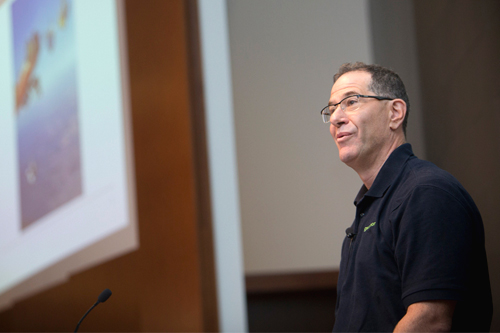This website uses cookies
We use cookies to ensure that we give you the best experience on our website. If you continue to use this site we will assume that you are happy with it.

David Litman A.B. ’79, J.D. ’82.
“So you’re one of three people in a plane going down,” began David Litman AB ’79, JD ’82. “An optimist is on the plane, a pessimist is on the plane, and a bureaucrat is on the plane. The optimist says, ‘Well, you know, I saw the movie “Airplane.” If I sit in the pilot seat and get messages from the tower, sure, I can land this plane.’ The pessimist says, ‘We’re all gonna die.’ The bureaucrat says, ‘Why don’t we form a committee and study this and really understand what’s going on?’ And the conservative entrepreneur? Well, he wasn’t even on the plane, ‘cause he was using frequent flier miles and got bumped.”
Litman was addressing students and faculty gathered for “Conservative Entrepreneurship: a Business Philosophy,” a lecture presented by the Dean’s Office on November 23.
Litman is the co-founder and CEO of Getaroom.com, as well as the former CEO of hotels.com, which he founded in 1991 with fellow Cornell Law School alumnus Robert Diener AB ’79, JD ’82. In 1984 he and Diener founded a discount airline business that became a multimillion dollar wholesale airfare consolidation operation. In 1991, the partners saw the untapped potential in the hotel industry, and with an investment of only $1,200, they founded what became hotels.com. They sold their interest and left the company in 2004. In 2008, they started Getaroom, a new hotel booking website focusing on hand-picked hotel deals in major cities.
“[David Litman] is a pioneer in the online travel industry, “ said Eduardo M. Peñalver, Allan R. Tessler Dean and professor of law, in his introduction to Monday’s lecture. “One of the themes that has emerged from the various alumni talks we’ve had this semester is the importance of relationships, and I think nobody better embodies that than Bob and David, who met here as classmates and then went on to found successful online companies.”
So what is conservative entrepreneurship? “Most people think, in order to found and grow a company, you have to mortgage the house, you have to borrow from an angel investor, you have to give away your equity, you have to max out your credit cards… but we saw it differently,” said Litman. He expounded on the four key principals of his business philosophy: be careful, be frugal, be quick, and be innovative.
How does a conservative entrepreneur conduct business? Treat the company’s money like your own, said Litman. “How cheap can you be? Print on both sides of the paper… Value an opportunity and devote resources accordingly… Make your mistakes faster.”
What sort of business does a conservative entrepreneur favor? Litman identified such elements as market potential (“You want a big pond.”), high margins, good cash flow, and opportunities for innovation.
Litman and Diener guided hotels.com from a start-up into the world’s largest hotel website during the heady days of the dot.com boom. Yet all along, Litman said, they were devoted to mitigating risk. He noted that this was the era when Internet companies were taking out multi-million-dollar Superbowl ads; he and his co-founder, however, recognized that they were in the midst of a bubble. In 2000 they opted to sell the majority of the company via auction rather than taking it public. The buyer did then take the company public, but, Litman said, the conservative entrepreneurship practices implemented by him and Diener kept hotels.com growing and profitable even as the NASDAQ sunk.
In discussing his current business, Getaroom, Litman had this advice for aspiring entrepreneurs: “This is a technology business. You all need to know how to program.” Also, “don’t skydive.” Conservative entrepreneurs, Litman told the audience, like to avoid risk and prefer making money to spending it. They understand customers, because they are customers. They drive older cars and brown-bag their lunches. They stay humble. “There are a lot of people in business that have success, and they get full of themselves, and they keep thinking that they can’t make a mistake,” he observed, “You need to have that fear, you need to have that desire, and you need to have that humility. And something to fall back upon, like a law degree.”